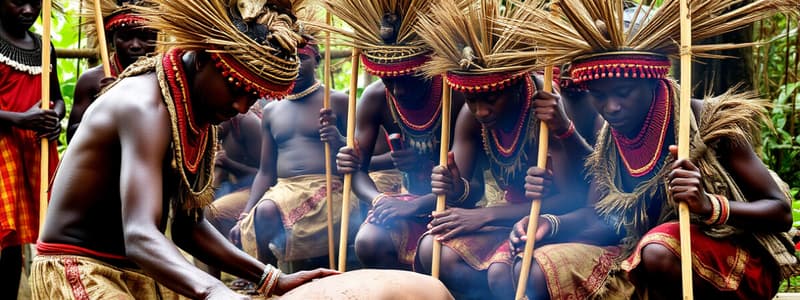Podcast
Questions and Answers
What is the primary purpose of famadihana?
What is the primary purpose of famadihana?
- To prepare meals for the deceased
- To perform religious rituals
- To celebrate the lives of the deceased (correct)
- To mourn the deceased
How long do the famadihana celebrations typically last?
How long do the famadihana celebrations typically last?
- Four days
- Three days
- Two days (correct)
- One day
What has contributed to the decline of famadihana practices?
What has contributed to the decline of famadihana practices?
- A rise in Christian beliefs
- Increased costs of silk shrouds
- Fear of diseases such as plague
- All of the above (correct)
What is done with the bodies at the end of the famadihana celebrations?
What is done with the bodies at the end of the famadihana celebrations?
Which festival of the dead is mentioned alongside famadihana?
Which festival of the dead is mentioned alongside famadihana?
What is famadihana commonly referred to as?
What is famadihana commonly referred to as?
What happens to bodies during the famadihana ceremony?
What happens to bodies during the famadihana ceremony?
What belief underlies the ritual of famadihana?
What belief underlies the ritual of famadihana?
How are bodies treated during the famadihana ceremony?
How are bodies treated during the famadihana ceremony?
What is done with the old shrouds during famadihana?
What is done with the old shrouds during famadihana?
Study Notes
Famadihana Tradition in Madagascar
- Famadihana, known as the "turning of the bones," is a traditional Malagasy belief that death is not permanent.
- Spirits are thought to live on in nature, with legends linking the creation of the indri lemur to a father and son lost in the forest.
- Deceased individuals are buried in large family tombs, wrapped in shrouds and placed alongside other family members.
- Spirits are believed to get bored or lonely while trapped inside tombs, prompting the tradition of famadihana to ensure their enjoyment.
- The belief is that spirits cannot move to the afterlife until their bodies completely decompose to dust.
Rituals and Celebrations
- Every few years, family tombs are opened for a grand celebration, marking the famadihana ceremony.
- Deceased bodies are removed from the tomb, wrapped in straw mats, and honored with music, dance, and food.
- During the ceremony, old shrouds are replaced, and names are rewritten on new shrouds to retain memory.
- Family members sometimes keep parts of the old shroud as charms, believed to carry the spirit's protection.
Cultural Significance
- Famadihana is more celebratory than mournful, akin to a family reunion rather than a funeral.
- Celebrations can last up to two days and foster communal bonding, reflecting joy in honoring the deceased.
- Despite its cultural importance, famadihana has declined in popularity due to rising silk shroud costs and opposition from Christian organizations.
Challenges and Decline
- Economic challenges make it difficult for poorer families to maintain the tradition.
- Diseases like plague have led to laws prohibiting famadihana rituals for those who die from such illnesses, impacting the tradition further.
- Though less common now, famadihana remains a vital aspect of Malagasy culture and identity.
Studying That Suits You
Use AI to generate personalized quizzes and flashcards to suit your learning preferences.
Related Documents
Description
Explore the unique Famadihana tradition of Madagascar, which reflects the belief that death is not permanent. This quiz covers the rituals and ceremonies involved in honoring deceased family members, including the grand celebrations that take place every few years. Discover the cultural significance of this fascinating practice and its impact on the Malagasy people.
